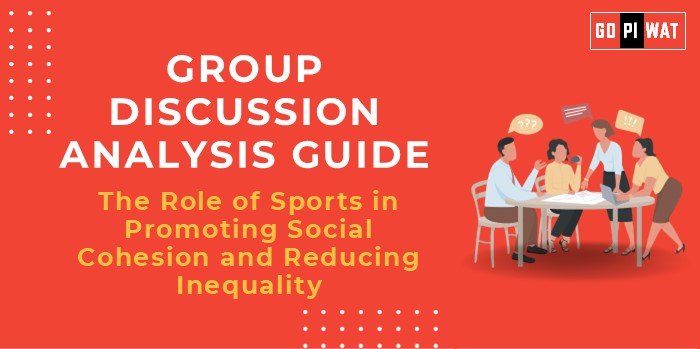📋 Group Discussion (GD) Analysis Guide: The Role of Sports in Promoting Social Cohesion and Reducing Inequality
🌐 Introduction to the Role of Sports in Promoting Social Cohesion
Opening Context: “Sports, often considered a universal language, has the power to bring diverse communities together, fostering unity and bridging gaps of inequality. From the Olympics to grassroots initiatives, the societal impact of sports goes beyond competition.”
Topic Background: Historically, sports have been used as a platform for social reform, such as Nelson Mandela’s use of rugby to unite post-apartheid South Africa. In recent years, sports initiatives worldwide, like FIFA’s “Football for Hope” campaign, emphasize inclusivity and community building.
📊 Quick Facts and Key Statistics
- Global Sports Economy: Valued at $500 billion (2023), reflecting its vast influence.
- Women’s Sports Participation: Increased by 33% globally in the last decade.
- Social Impact Initiatives: Programs like “Right to Play” operate in 15+ countries, benefiting 2.3 million children.
- India’s Khelo India Scheme: Allocated ₹3,400 crores in 2024 to boost grassroots sports.
🔗 Stakeholders and Their Roles
- Government Agencies: Promote inclusivity through sports policies like “Khelo India” and public sports facilities.
- Non-Governmental Organizations (NGOs): Empower marginalized communities through sports-based development programs.
- Private Corporations: Sponsor initiatives for talent development and infrastructure under Corporate Social Responsibility (CSR).
- International Bodies: Advocate for sports as a tool for peace and development (e.g., International Olympic Committee).
- Citizens and Local Communities: Drive participation, especially at grassroots levels.
🏆 Achievements and Challenges
Achievements:
- Gender Equality: Programs like FIFA Women’s World Cup promote women’s participation in sports, inspiring millions globally.
- Community Development: Kabaddi tournaments in rural India foster local unity and talent recognition.
- Economic Impact: Sports events generate employment and tourism, reducing financial inequalities in host regions.
- Inclusion of Differently-Abled Athletes: The Paralympics showcases global progress in diversity and inclusion.
Challenges:
- Access Disparities: Rural and underprivileged areas lack sports facilities and resources.
- Gender Discrimination: Female athletes often face bias and underfunding compared to their male counterparts.
- Corruption and Mismanagement: Funds allocated for sports development are sometimes misappropriated.
- Global Comparisons: While countries like Norway invest heavily in inclusive sports policies, nations like India lag in infrastructure for marginalized communities.
Case Study: Brazil’s “Street Football World” initiative has successfully reduced violence and fostered youth engagement in disadvantaged areas.
📖 Structured Arguments for Discussion
- Supporting Stance: “Sports unify communities and promote equality by breaking down social barriers.”
- Opposing Stance: “The benefits of sports are limited to urban and privileged sections, neglecting rural and marginalized communities.”
- Balanced Perspective: “Sports have transformative potential, but systemic reforms are needed for widespread impact.”
💡 Effective Discussion Approaches
Opening Approaches:
- Data-Driven Start: “With global sports valued at $500 billion, its role in fostering equality is undeniable.”
- Anecdotal Opening: “The story of refugee Olympian Yusra Mardini highlights how sports can inspire and integrate marginalized communities.”
Counter-Argument Handling:
- Acknowledge disparities in access and suggest scalable solutions like mobile sports clinics and scholarships for underprivileged athletes.
📊 Strategic Analysis of Strengths and Weaknesses
- Strengths: Promotes unity, economic development, and global visibility.
- Weaknesses: Infrastructure gaps, gender disparities, and corruption.
- Opportunities: Public-private partnerships, tech-enabled outreach, and inclusivity policies.
- Threats: Mismanagement and unequal resource distribution.
🔗 Connecting with B-School Applications
- Real-World Applications: Explore projects on sports management, CSR funding for sports, and marketing strategies for inclusivity campaigns.
- Sample Interview Questions:
- “How can sports initiatives address gender inequality?”
- “What role does corporate sponsorship play in grassroots sports development?”
- Insights for Students:
- Sports promote leadership and teamwork, vital in management roles.
- Understanding sports economics is crucial for consulting and development projects.


